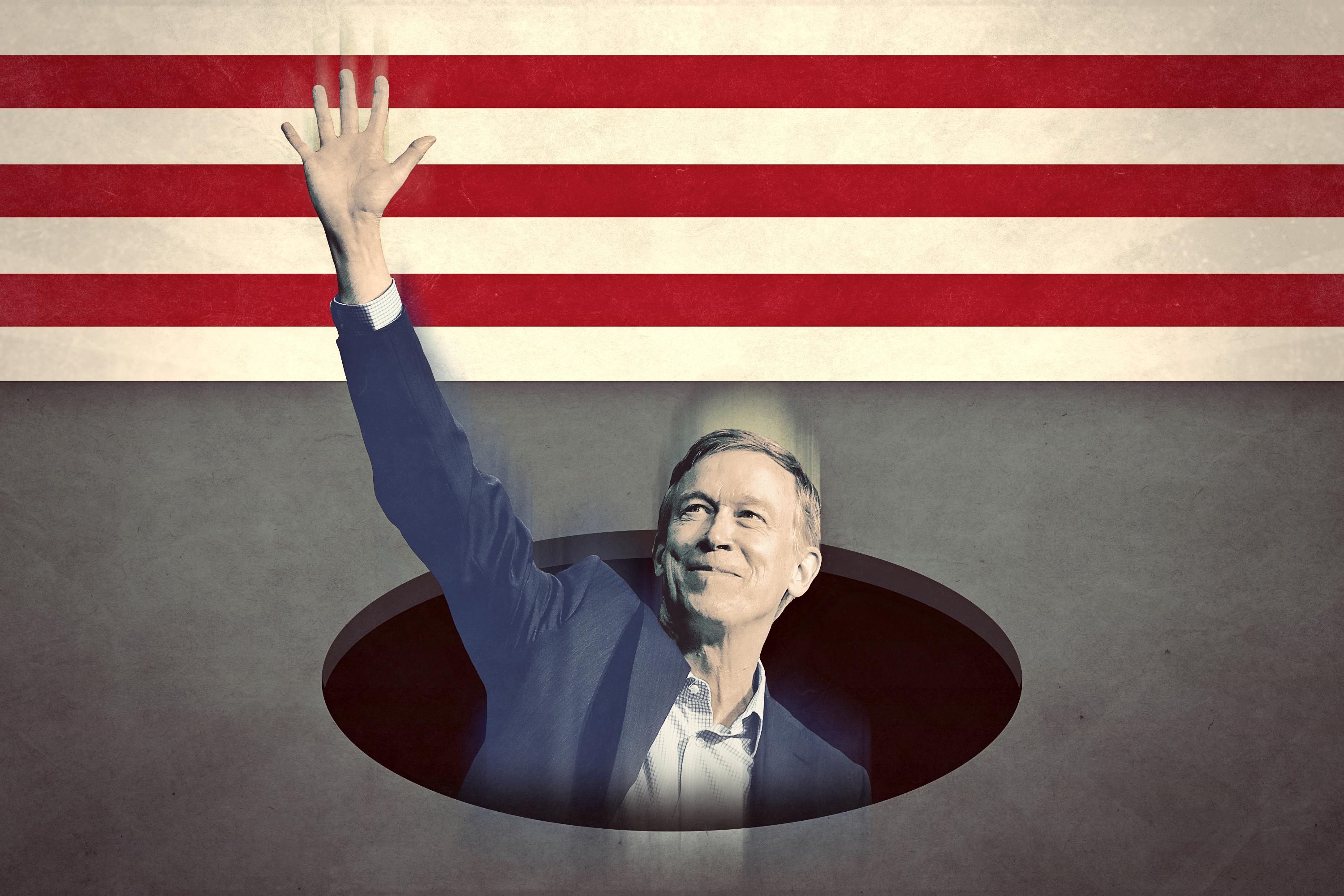There’s a More Productive Path Forward for Presidential Dropouts
John Hickenlooper, who barely registered in Democratic primary polling, withdrew from the race and will consider running for Colorado’s open Senate seat. It’s a course of action other long-shot candidates, particularly Beto O’Rourke, should consider.
For five unremarkable months, John Hickenlooper ran for president. The former Colorado governor polled at nearly 0 percent in a crowded Democratic primary field that, in fairness, relegates sitting U.S. senators to single-digit support. Even Beto O’Rourke, the Texas wunderkind, currently polls at 3 percent. But Hickenlooper’s numbers were so low they annihilated his presidential potential statistically. It was hard to parse Hickenlooper’s appeal—he ran so at odds with the party’s dominant left-wing currents as to stand, defiantly, as an anachronism in the two primary debates. On Thursday, Hickenlooper ended his campaign, among the first of long-shot presidential candidates to exit the race before the Iowa caucuses and the New Hampshire primary in February 2020.
Hickenlooper’s withdrawal from the race allows him to jump-start the next phase of his political career. He’s widely expected to run for U.S. Senate in his home state of Colorado. “I’ve heard from so many Coloradans who want me to run for the United States Senate,” Hickenlooper said as he announced his withdrawal. “I intend to give that some serious thought.” Hickenlooper didn’t appear to take the Senate very seriously until his presidential aspirations collapsed. In February, shortly before he launched his presidential campaign, he told an Iowa crowd, “I’m not cut out to be a senator,” words he might come to regret. Of course, his late entry into the Colorado Senate primary recalls his successful bid to become Denver mayor 16 years ago. “I was the last person to get into that race. Everyone told me I was six months too late,” Hickenlooper told Politico.
Hickenlooper’s ambivalence about the Senate is indicative of a significant problem the Democratic Party faces heading into November 2020. For three years, Democrats have agonized about Donald Trump so exclusively that they seem to have developed no electoral strategy to overcome Senate Majority Leader Mitch McConnell. In Colorado, Hickenlooper commands a 50-point lead over his nearest rival in the 2020 Democratic Senate primary contest. Should he enter the race—as Democratic congressional leaders are urging him to do—the nomination appears to be his to lose. The contrast between Hickenlooper’s electoral fortunes in the Colorado Senate race and his presidential campaign underscores the delusion of so many Democratic candidates vying for the party’s presidential nomination despite barely registering in the polls. They seek an unattainable office when they might benefit the party by running for lower offices instead. A presidential campaign allows long-shot candidates to raise money from national networks and increase their national profiles, but they also waste money campaigning in random states while courting far more scrutiny than they’re typically built to withstand. During Hickenlooper’s two terms as governor in Colorado, he championed environmental regulations and gun-ownership restrictions. He otherwise aligned himself with the statewide business leaders to support fracking in cringeworthy fashion. Among the presidential primary field, Hickenlooper proved too redundant for national acclaim. By the time he ended his campaign, 56 percent of Democrats had formed no opinion about him, according to a FiveThirtyEight average of August polls. He is, by no measure, too good for the Senate.
Hickenlooper the presidential candidate always appeared to be skipping a step between statewide success and national prominence. His presidential campaign seemed to discount his significance in Colorado politics rather than emphasize it; the Rocky Mountains are, apparently, little more than stepping stones to grand national ambitions. The senior Colorado senator, Michael Bennet, also seeks the 2020 Democratic presidential nomination. He too preaches moderation against left-wing impulses, and he too polls around 0 percent in the Democratic primaries. But Bennet polls favorably among his constituents in Colorado, the same voters who might want to replace their unpopular Republican senator, Cory Gardner, whose seat is up for re-election in November 2020. It’s far more productive for Hickenlooper to direct his efforts toward beating Gardner and flipping a Senate seat rather than sustain a flailing presidential campaign. Indeed, it’s a message Hickenlooper’s staff delivered to him last month when several key aides announced their departure from the campaign. Hickenlooper’s main challenger in the Colorado Democratic primary would be Andrew Romanoff, a progressive who, unlike Hickenlooper, supports “Medicare for All” and the Green New Deal. Hickenlooper proved to be too moderate to challenge the progressives in the presidential primary and may prove too late to challenge his progressive rivals back home.
O’Rourke’s presidential candidacy presents a similar conundrum. He rose to national prominence for his challenge of Ted Cruz’s Senate seat in the 2018 midterms. But his 2020 campaign has floundered, and so he might ideally—eventually—exit the presidential contest to challenge Republican John Cornyn for his Senate seat in 2020. Cornyn is significantly less popular in Texas than Cruz, who defeated O’Rourke by a historically narrow 2 percent margin. But O’Rourke has thus far resisted Hickenlooper’s realization. After a nearly two-week break to address the recent shooting in his hometown of El Paso, O’Rourke relaunched his presidential campaign Thursday with a far more alarmist tone. “If, at this moment, we do not wake up to this threat,” O’Rourke announced, “then we as a country will die in our sleep.” Speaking from El Paso, O’Rourke was addressing a national audience—as if Texas itself weren’t a critical battleground in his party’s war against Trump. In his campaign relaunch, O’Rourke describes life-or-death stakes for the country in the next presidential election. But he speaks from a self-serving ultimatum: the presidency or bust. On Thursday, O’Rourke told MSNBC, “I will not, in any scenario, run for the U.S. Senate.” He adds, “I’m taking this fight directly to Donald Trump.” O’Rourke has yet to explain why he regards the Senate, as ruled by McConnell, like some distant, irrelevant front.
Hickenlooper and O’Rourke are hardly the first presidential candidates whose campaigns persisted despite the poor odds, long hours, steep expense, and, presumably, better uses for their time. Four years ago, Trump entered the 2016 Republican presidential primary to bypass the more modest steps in the traditional political career. In 2019, businessman Andrew Yang entered the Democratic presidential contest as a long-shot candidate who intends to build a national political constituency from scratch. That’s one egocentric way to enter the political arena. But conventional partisan figureheads such as Hickenlooper and O’Rourke can better serve their party, and their own political ambitions, by pursuing more realistic targets. Seeking the presidency as a personal achievement might come at the expense of a Congressional majority that Democrats will need to overcome McConnell’s dominance in the Senate. President Trump isn’t the only politician who matters, and Democrats do themselves a disservice by focusing solely on the executive branch. The party is four senators short of a majority. If only there were ambitious and well-funded Democratic candidates to run for open seats in a competitive state.

